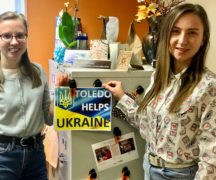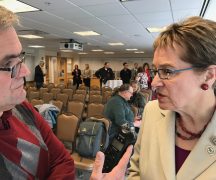By DAVID DUPONT
BG Independent News
A year after the Russian invasion of Ukraine, President Vladimir Putin is ratchetting up diplomatic pressure, hoping to fracture the Western alliance because in a way his military has failed destroy the Ukrainians.
Professor Neal Jesse, author of the 2020 book “Learning From Russia’s Recent Wars : Why, Where, and When Russia Might Strike Next,” said that Putin’s announcement that Russia would pause its participation in the START II “is not surprising.”
“Putin has t shown a propensity to use escalations as a way to try to back down the West,” he said. “He’s done a lot of nuclear saber rattling.”
That’s been echoed in the state-run media and by other officials.
And the Russians have not been fulfilling their part of the agreement for a while.
This shows Putin’s willingness to break away from international treaties at a crucial time.
An envoy from China is in Russia now, and there are concerns in the West that the Chinese will, or already has, been providing lethal aid.
Putin is rationalizing that the United States and the European Union fear greater alliances with China. He hopes, Jesse said, this will “wear down the West’s resilience and willingness to back Ukraine.”
Jesse’s colleague Professor Edgar Landgraf said he’s been surprised by “how united Europe remains” in the face of the economic and military challenges. That includes the flow of refugees from Ukraine. “It’s less surprising given the consequences of letting Russians win the war and run over Ukraine in terms of national security.”
That would also expose other neighbors of Russia, especially those formerly part of the Soviet bloc, such as Moldovia and Estonia, to invasion.
Those refugees include Anastasiia Kryzhanivska’s mother and her in-laws. Her mother is in Switzerland, and her in-laws were in Bulgaria, and have moved to Romania. To be closer to Ukraine, said Kryzhanivska, who directs the ESOL at BGSU. “They really want to get back home.”
Their temporary resident status expires in May, and they hope to move back to Ukraine then.
Kryzhanivska’s mother is also wanting to return to her home in Mykolaiv. A neighbor is watching over her apartment – watering the plants which she loves and dusting. There is no fighting in the city, but there are Russian troops in one part of the region. And nowhere in Ukraine is safe from bombing or shelling, Kryzhanivska said.
While her mother is eager to return, the daughter is less enthusiastic. “I don’t know if this is a good time to do that. We don’t know when this will be over.”
The city does not have water service and experiences periodic power outages.
“A lot of people are going back,” she said. “Life goes on.” There are even new coffee shops, restaurants, and other businesses opening.
Kryzhanivska’s father, a 59-year-old dance teacher, was conscripted into the Army.
She has occasional contact with him, but does not know where he is stationed, or what his position in the military. “I don’t think I should know that.”
But he tries to reassure her. “We’re working on it. We’re going to win.”
In the past year, she said, “we learned that the world is willing to support Ukraine. That is wonderful, This is something that did not happen in 2014.”
That’s when Russian troops invaded and took over Crimea. “If the world had supported us in 2014, the way they are now, we would not be having this war now,” she said.
It’s good to see support from governments , organizations, and individuals.
It’s heartening yet, it’s still difficult. There’s a disconnect between social media posts of people enjoying their lives, as they should, she said, and the horrid scenes of burned-out building and news of torture rooms from Ukraine.
“We think that Ukraine will win,” she said, “because light always prevails over darkness. This will end.”
Education is “her front,” Kryzhanivska said.
She’s recently published a paper and will be presenting on her study of Russian rhetoric leading up to the 2014 war.
She also offers English and Ukrainian classes and tutors online, mostly for Ukrainians. The students donate their fees to Ukraine. And Kryzhanivska donates her own money.
Jesse noted that If Putin “had advantage he’d be offering peace negotiations.” That would mean keeping the territory the Russians now occupy.
“But Ukraine wants territory back. That’s understandable,” he said. “Can Russia be expelled from all of Ukraine? It’s difficult to see that now.”
The Russia military has been seriously weakened by the conflict. By some accounts, half their armored forces and a quarter of their artillery have been destroyed.
“Military units have been very ineffective,” Jesse said. “Relying on mercenary units is sign a sign that the Department of Defense is in trouble.”
But the Russians have shown in the past that they can rebound, that their defense establishment can become more efficient. “If we give them more time they will get better.”
That is if their economy holds up, and Putin retains power. Russia has had sudden, mysterious changes in regimes, Jesse said. But the West can’t count on that. Putin’s hold on power has only been weakened a little, it seems, in the past year.
That makes the urgency of evicting the Russians from Ukraine even greater.
The looming question is whether the war develops into a showdown between Western democracies and authoritarian regimes – Russian, North Korea, Iran, and even China.
“Everyone wants to see this resolved before these bigger issues come into play,” Jesse said. “There’s a time limit to this. The longer it becomes frozen the worse it is for the West.”





